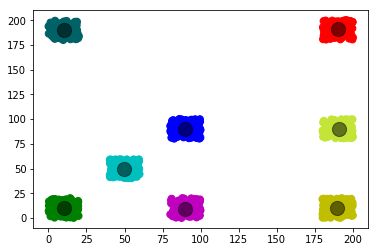In this paper we want to compare two diffrent algorithms for k-means clustering, first is Quantum Inspired Genetic Algorithm that we will implement it from Quantom Inspired genetic article, and second is a simple genetic algorithm from another article.
- Introduction
- Quantum-inspired genetic algorithm for k-means clustering implementation
- Genetic algorithm for k-means clustering implementation
- Comparison of two algorithm
- Conclusion
Clustering plays an important role in many unsupervised learning areas, such as pattern recognition, data mining and knowledge discovery. Clustering problem can be summarized as: Given n points in Rd space and an integer k, find a set of k points, called centroids, such that the sum of the distances of each of the n points to its nearest centroid is minimized. Generally speaking, conventional clustering algorithms can be grouped into two main categories, namely hierarchical clustering algorithms and partitional clustering algorithms. A hierarchical clustering algorithm outputs a dendrogram, which is a tree structure showing a sequence of clusterings with each clustering being a partition of the dataset. Unlike the hierarchical clustering algorithm, the partitional clustering algorithms partition the data set into a number of clusters, and the output is only a single partition of the data set. The majority of partitional clustering algorithms obtain the partition through the maximization or minimization of some criterion functions. Recent researches show that the partitional clustering algorithms are well suited for clustering a large dataset due to their relatively low computational requirements. And the time complexity of the partitional algorithms is almost linear, which makes them widely used. Among the partitional clustering algorithms, the most famous one is k-means clustering. K-means clustering algorithm first randomly generates k initial cluster centroids. After several iterations of the algorithm, data can be classified into certain clusters by the criterion function, which makes the data close to each other in the same cluster and widely separated among clusters. However, the traditional k-means clustering algorithm has two drawbacks. The one is that the number of clusters has to be known in advance, and the other is that the clustering result is sensitive to the selection of initial cluster centroids and this may lead the algorithm converge to the local optima. Different datasets have different number of clusters, which is difficult to known beforehand, and the initial cluster centroids are selected randomly, which will make the algorithm converge to the different local optima. Therefore, a lot of research efforts have been conducted on mitigating the two drawbacks of the conventional k-means clustering algorithm. The genetic algorithm (GA) is one of the methods to avoid local optima and discover good initial centroids that lead to superior partitions under k-means.
https://www.sciencedirect.com/science/article/pii/S095741740901063X
